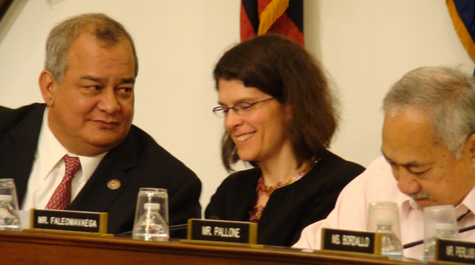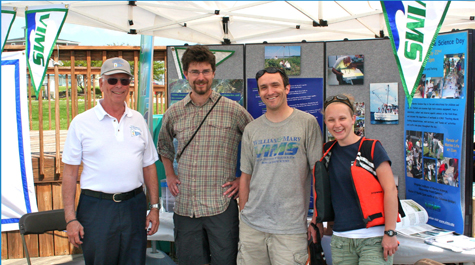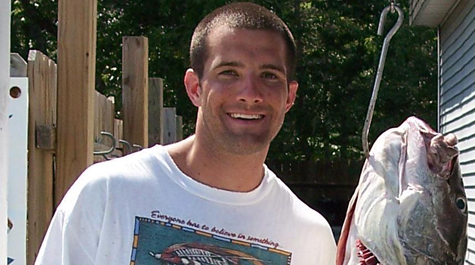VIMS alumni have long history of service on Capitol Hill
Graduate students Theresa Davenport and Gabrielle Saluta of the Virginia Institute of Marine Science have been selected as finalists for the prestigious John A. Knauss Marine Policy Fellowship for 2013.
The pair’s selection continues a long tradition of VIMS students earning these respected fellowships through the National Sea Grant Federal Fellows Program. Since its inception in 1979, 34 VIMS students and recent alumni have made the trip to our nation’s capitol for the one-year program, which places highly qualified graduate students from across the nation with hosts in legislative or executive offices in Washington, D.C. The experience provides a hands-on education in the policies and processes of the federal government.
The Fellowship, named for former NOAA administrator and Sea
Grant founder John A. Knauss, was created for students with an interest in
ocean, coastal, and Great Lakes resources, and the national policy decisions
affecting those resources. Two VIMS graduates—Lindsey Kraatz and Chris Prosser—are
currently representing the Institute on Capitol Hill until the 2012 Program
comes to an end in January.
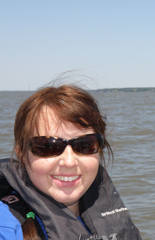
Prosser says he applied to the Program to explore the interface between science and policy. “Scientists are not rule makers, so unless there is effective and efficient communication between researchers and regulators, the greatest discoveries may never leave the lab,” he says. Prosser is currently in the U.S. Environmental Protection Agency’s Ecological Health and Protection Branch where he assists in setting water-quality standards based on phosphorous, nitrogen, and chlorophyll.
Kraatz heard about the Knauss Fellowship during her first year at VIMS. “I saw students come and go from the Program and they told me how fantastic their experiences were,” she says. “I applied because I wanted to gain experience and learn more about marine policy.”
Before Davenport and Saluta are placed in a particular agency, they have to complete “placement week”, which this year takes place in early December. During the week, fellowship finalists attend briefings with Congressional staffers, current fellows, and members of host offices. In addition, there is a demanding round of 12-15 interviews over the course of two days.
VIMS alumna and 2011 Knauss Fellow Heidi Geisz recounts her experience during placement week as being “intense, overwhelming, and fun.” “That week was a great trial and error for the year to come, and I really enjoyed the experience,” she says. “I know my interview skills improved exponentially.” Geisz served as a Legislative Fellow in the Natural Resources Committee staff, and subcommittee on Fisheries, Wildlife, Oceans and Insular Affairs.
Alumnus and 2004 Knauss Fellow Jacques Oliver agrees with Geisz and recalls that week as being both stressful and exhilarating at the same time. “One minute I was a lowly graduate students and the next minute I was working in the halls of Congress,” he says. “My year as a Knauss Fellow had a profound impact on me personally and professionally and gave me some insight into the underlying drivers of decision-making and policy development that are not readily apparent to someone observing the management of natural resources from outside the federal government.”
VIMS alumnus and 2007 Knauss Fellow Matt Strickler says the
fellowship exposed him to so many facets of federal policy making that it
helped him focus on exactly what he wanted to do professionally. Now a Democratic Professional Staff member
for the U.S. House of Representatives committee on Natural Resources, Strickler
credits the fellowship with helping him get the job. “I learned an unbelievable
amount about the interplay between science and policy, and I definitely would
not have been hired for my current position had I not served as a Knauss
Fellow.” Prior to his work in Congress, Strickler served for three years as a
Legislative Assistant to Virginia Senator Ralph S. Northam, whose 6th
District covers all or part of Accomack County, Mathews County, Norfolk, Northampton
County, and Virginia Beach.
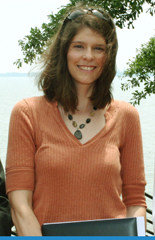
The current and former fellows all agree that VIMS helped prepare them for the Program on a variety of levels. “VIMS provided me with a great interdisciplinary education that instilled in me a solid understanding of many key concepts that I have encountered while working on the Hill,” says Kraatz. “VIMS encourages its students to communicate with others through publications, departmental seminars, and national conferences, which helped me polish my communication skills and help me effectively convey important data to managers and decision makers,” adds Prosser.
Cassie Bradley—a 2011 graduate of VIMS’ School of Marine Science—served as a Great Lakes Commission Fellow—a program that is also managed and funded by Sea Grant. “I was really excited to take everything I learned at VIMS and go to the Great Lakes region and give back to the area professionally and intellectually,” she says. “I also got to interact with the Knauss Fellows in D.C. and get that exposure as well.”
Saluta and Davenport are proud to continue the VIMS legacy on Capitol Hill, and are both eager to get to Washington. “I am really looking forward to getting exposure to the way science is used and viewed in non-academic settings, as well as making connections and gaining work experience,” says Davenport. “My previous experiences have been in management, education, and academia, so I'm really looking forward to seeing how policy fits into the whole process,” adds Saluta.
The Knauss program is administered through Sea Grant, a nationwide network of 32 university-based programs, administered through NOAA, that work with coastal communities to foster science-based decisions about the use and conservation of aquatic resources. The Virginia Sea Grant program is housed on the VIMS campus in Gloucester Point and administered through VIMS and the College of William and Mary.


